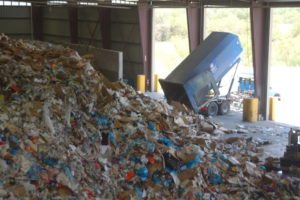 Low commodities prices and increasing contamination have forced materials recovery facilities in Great Britain to significantly increase charges to municipal partners, a survey shows.
Low commodities prices and increasing contamination have forced materials recovery facilities in Great Britain to significantly increase charges to municipal partners, a survey shows.

 Low commodities prices and increasing contamination have forced materials recovery facilities in Great Britain to significantly increase charges to municipal partners, a survey shows.
Low commodities prices and increasing contamination have forced materials recovery facilities in Great Britain to significantly increase charges to municipal partners, a survey shows.
 Since being introduced to the market, single-use beverage containers have caused much debate – both in the beverage industry and among politicians and the public. A simple question sits at the center of the arguing: What’s the most efficient way to collect beverage containers for high-quality recycling?
Since being introduced to the market, single-use beverage containers have caused much debate – both in the beverage industry and among politicians and the public. A simple question sits at the center of the arguing: What’s the most efficient way to collect beverage containers for high-quality recycling?
 Big bag changes take effect in Morocco, and coffee chains in the U.K. push forward goals to recycle paper cups.
Big bag changes take effect in Morocco, and coffee chains in the U.K. push forward goals to recycle paper cups.
 Several workers were killed in an accident at a U.K. metals recycling operation, and Hong Kong beachgoers can’t find the sand through the trash.
Several workers were killed in an accident at a U.K. metals recycling operation, and Hong Kong beachgoers can’t find the sand through the trash.
 Waste pickers in Rio de Janeiro are playing a key role in recycling during the Olympics, and India is set to receive its first integrated vehicle recycling facility.
Waste pickers in Rio de Janeiro are playing a key role in recycling during the Olympics, and India is set to receive its first integrated vehicle recycling facility.
 The UN’s top environmental scientist tells a group assembled in Kenya that biodegradable plastics are a false solution to the marine plastics problem, and a Dutch city uses a full suite of technology to optimize its collection routes.
The UN’s top environmental scientist tells a group assembled in Kenya that biodegradable plastics are a false solution to the marine plastics problem, and a Dutch city uses a full suite of technology to optimize its collection routes.
 Since the European Commission unveiled its Circular Economy (CE) package last December, there has been significant discussion around the proposed legislation. And perhaps the most vexed topic to date has been how best to calculate recycling rates in the EU and whether to include reuse activities in that determination.
Since the European Commission unveiled its Circular Economy (CE) package last December, there has been significant discussion around the proposed legislation. And perhaps the most vexed topic to date has been how best to calculate recycling rates in the EU and whether to include reuse activities in that determination.
 A leader in a German village vows to fight food scrap collection, and an online panel will discuss ways to reverse the U.K.’s falling recycling rate.
A leader in a German village vows to fight food scrap collection, and an online panel will discuss ways to reverse the U.K.’s falling recycling rate.
